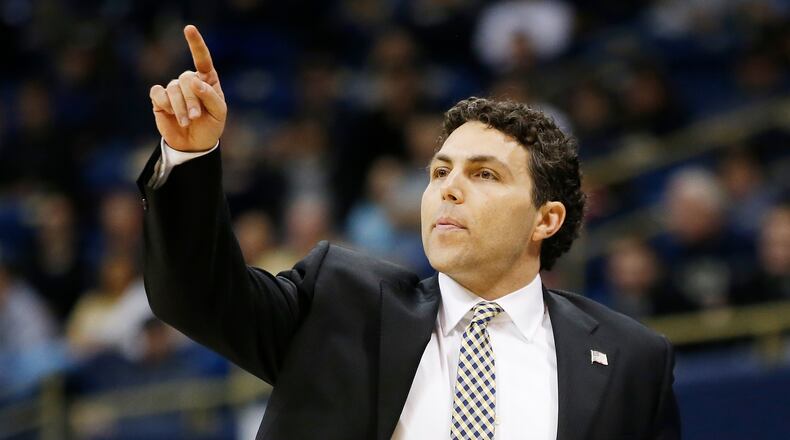Two months after he was publicly accused of committing and encouraging NCAA rules violations and committing sexual assault against an acquaintance, Georgia Tech men’s basketball coach Josh Pastner told his side of the story.
In a lawsuit filed Friday in the Arizona Superior Court in Pima County, Pastner contends that Arizona residents Ron Bell and his girlfriend Jennifer Pendley attempted to extort and blackmail him and also made false accusations of sexual assault. In a statement provided by his attorneys, Pastner vehemently denied the allegations of assault and having knowledge of the NCAA rules violations.
“I am disgusted and devastated by the actions of two individuals to whom I showed compassion,” Pastner said in a statement provided by his attorneys. “My family and I are victims of fraud and extortion and the extent to which these individuals have gone to harm us is truly unfathomable. I absolutely and unequivocally never assaulted or harassed Ms. Pendley and I am truly sickened by these false claims.”
After his team’s win Saturday afternoon at Pittsburgh, Pastner was asked what he hoped to accomplish by the lawsuit.
“Obviously, I think when you read everything in there from my statement and the lawyers and you read everything, I think everything is obviously self-explanatory,” he said.
Reached early Saturday, Bell called Pastner’s statements “100 percent false.”
Tech announced in November that the NCAA suspended basketball players Tadric Jackson for three games and Josh Okogie for six for accepting impermissible benefits in the form of airfare, meals and apparel. Jackson’s benefits were valued at about $525, Okogie’s at $750, providing the basis for the length of the suspensions. At the time of the announcement, Pastner declined to go into specifics about the violations.
A CBS Sports article that month identified Bell as the individual behind the benefits and that he was a friend of Pastner’s. According to Bell’s account in the CBS Sports article, Jackson and Okogie were flown to Arizona in May for five days. In addition, Bell purchased their meals and bought them apparel. Bell alleged Pastner was aware of the trip and tacitly encouraged it.
However, Tech determined Pastner did not know about the violations until months afterward, at which point he reported them to the athletic department’s compliance office, which then reported them to the NCAA.
The Georgia Tech Athletic Association provided an emailed statement about the latest legal case: “We are aware that Georgia Tech men’s basketball head coach Josh Pastner has filed a civil lawsuit in Arizona. Coach Pastner and his legal team have been keeping Georgia Tech fully appraised of the situation, and we support Coach Pastner in his efforts to address this personal matter. Georgia Tech does not comment on pending legal cases.”
Bell and Pastner had a relationship that dates back about a dozen years, when Pastner was an assistant basketball coach at Arizona. Bell credited Pastner with saving his life by directing him to help to treat his addiction to prescription drugs at the time and years later, after Bell had served a 4 1/2-year prison sentence for a felony narcotics conviction, according to the complaint, gave Pastner credit for helping him through radiation treatments for prostate cancer.
Bell became an unwavering supporter of Pastner’s, driving from his home in Tucson, Ariz., to Memphis, Tenn., where Pastner was coaching at Memphis, to support him.
A 2013 email from Bell to Pastner included in the complaint paints a picture of the relationship.
“You are the genuine article,” Bell wrote. “I am proud of you Josh. I am thankful that you are a part of my life. You actually make me want to be a better man.”
An August 2015 email read in part, “I am your biggest and most ardent supporter. I always have your back. That’s because I believe in you and what you stand for.”
The relationship soured over a dispute with a member of the team’s staff and when Bell sought payment for alleged work he did supporting the Memphis and, later, Tech basketball teams, Pastner refused. The lawsuit termed Bell’s claim that he had worked for payment for Pastner “a thinly veiled ruse to blackmail and extort Pastner.”
When that failed, Pastner’s lawyers contended in the complaint, Bell and Lindley switched tactics and alleged that Pastner had sexually harassed Lindley, a charge that Pastner “vehemently, categorically and unconditionally denies,” according to the complaint. The suit paints Bell as dishonest, antisocial and having a history of arrests and criminal convictions. It cited a 2006 protection order for Bell’s then-wife against Bell after she alleged that she was “scared to death” of him after an alleged violent incident.
Exhibits filed with the lawsuit assert that Bell had an extensive criminal history, but much of it could not be confirmed independently on deadline. Arizona Department of Corrections records do state that Bell was released in October 2013 after serving more than four years in prison on drug-related charges.
Staff writer Willoughby Mariano contributed to this article.
About the Author
Keep Reading
The Latest
Featured



